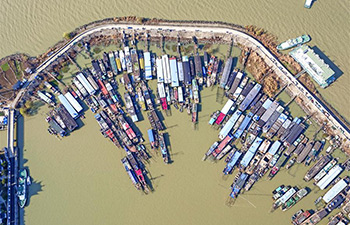SYDNEY, Dec. 14 (Xinhua) -- While anecdotal evidence appears to suggest there are more sharks prowling Australia's east coast than ever before, a new study released on Friday showed that shark numbers are actually rapidly declining.
With the analysis of more than five decades of data, researchers from Griffith University and University of Queensland (UQ) were able to identify the drop in population by examining Queensland State's Shark Control Program, which uses baited drum lines and nets to protect beachgoers and surfers from the deadly predators.
Established in 1962, the program now covers 1,760 km of the Queensland coast.
"What we found is that large apex sharks such as hammerheads, tigers and white sharks, have declined by 74 to 92 percent along Queensland's coast," co-author of the study and UQ School of Biological Sciences researcher Dr George Roff said.
"And the chance of zero catch - catching no sharks at any given beach per year - has increased by as much as seven-fold."
"The average size of sharks has also declined - tiger sharks and hammerhead sharks are getting smaller."
In stark contrast with the common assumption by many Australians that shark numbers are on the rise, and a growing number of calls from large sectors of the community to consider a "shark cull," the findings are likely to come as a massive shock for most Australians.
Last year alone, there were at least 13 shark attacks on the country's east coast, according to figures from Taronga Zoo's Australian Shark Attack File.
"We were surprised at how rapid these declines were, especially in the early years of the shark control program," said Dr Chris Brown, co-author of the study from Griffith's University's Australian Rivers Institute.
"We had to use specialist statistical methods to properly estimate the declines, because they occurred so quickly."
"We were also surprised to find the declines were so consistent across different regions, beaches that had nets and drum lines installed in later years, like the late 1970s and 1980s, already had lower shark catches than at beaches where fishing started in the 1960s, so this suggests the declines were widespread," he added.
While it is not entirely understood why shark numbers have been decreasing over the past 55 years, researchers believe it is likely due to overfishing and not caused by the Queensland Shark Control Program, which they say has only had a "localized impact" on population figures.
Although the thought of the fearsome creatures is often enough to bring shivers down the spine of beachgoers due to their terrifying, blood-thirsty depiction in movies, researchers insist that sharks must be protected because of their vitally important role in the ocean's ecosystem.
"Sharks are an important part of Australia's identity and play important roles in ecosystems as scavengers and predators, and they are indicators of healthy ecosystems," Brown said.
"These declines are concerning because they suggest the health of coastal ecosystems is also declining."
"It would be a great tragedy if we lost these species because of preventable human causes."













